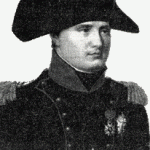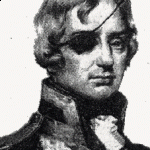The Napoleonic Wars Begin
Category: 19th century
In the 1790′s, the wars of the French Revolution merged into the Napoleonic Wars, as Napoleon Bonaparte took over the French revolutionary government. At first the war did not go well for Britain. The First Coalition with Prussia, Austria, and Russia against the French collapsed in 1796, and in 1797 Britain was beset by naval defeat and by naval mutiny. The Battle of the Nile in 1798, however, was one of the hours of the British Navy brightest glory. Bonaparte was climbing to power in France, by directing her successful arms against the world. He had beaten Germany and conquered Italy; he had threatened England, and his dream was of the conquest of the East. Like another Alexander, he hoped to subdue Asia, and overthrow the hated British power by depriving it of India. Hitherto, his dreams had become earnest by the force of his marvellous genius, and by the ardour which he breathed into the whole French nation. And when he set sail from Toulon, with 40,000 tried and victorious soldiers and a magnificent fleet, all were filled with vague expectations of almost fabulous glory. He swept away the Knights of St. John from their rock of Malta, and sailed for Alexandria in Egypt, in the end of June, 1798.
His intentions had not become known, and the English Mediterranean fleet was watching the course of this great armament. Sir Horatio Nelson was in pursuit, with the English vessels, and wrote to the First Lord of the Admiralty: “Be they bound to the Antipodes, your lordship may rely that I will not lose a moment in bringing them to action”.
Nelson had, however, not ships enough to be detached to reconnoitre, and he actually overpassed the French, whom he guessed to be on the way to Egypt. He arrived at the port of Alexandria on the 28th of June, and saw its blue waters and flat coast lying still in their sunny torpor, as if no enemy were on the seas. He went back to Syracuse, but could learn no more there. He obtained provisions with some difficulty, and then, in great anxiety, sailed for Greece, where at last, on the 28th.of July, he learnt that the French fleet had been seen from Candia, steering to the south-east, about four weeks since. In fact, it had actually passed by him in a thick haze, which concealed each feet from the other, and had arrived at Alexandria on the 1st of July three days after he had left it. Every sail was set for the south, and at four o’clock in the afternoon of the 1st of August a very different sight was seen in Aboukir Bay, so solitary a month ago. It was crowded with shipping. Great castle-like men-of-war rose with all their proud calm dignity out of the water, their dark portholes opening in the white bands on their sides, and the tricoloured flag floating as their ensign. There were thirteen ships of the line and one, towering high above the rest, with her three decks, was L’Orient, of 120 guns. The British had only fourteen little ships, not one carrying more than 74 guns, and one only 50.
Why Napoleon had kept the fleet there was never known. In his usual way of disavowing whatever turned out ill, he laid the blame upon his naval officers. But, though dead men could not tell tales, his papers made it plain that the ships had remained in the obedience to commands, though they had not been able to enter the harbour of Alexandria. Large rewards had been offered to any pilot who would take them in, but none could be found who would venture to steer into that port a vessel drawing more than twenty feet of water. They had, therefore, remained at anchor outside, in Aboukir Bay, drawn up in a curve along the deepest of the water, with no room to pass them at either end, so that the commanders reported that they could bid defiance to a force more than double their number. The French believed that Nelson had not ventured to attack them when they had passed by one another a month before, and when the English fleet was signalled, they still supposed that it was too late in the day for an attack to be made.
Nelson had, however, no sooner learnt that the French were in sight than he signalled from his ship, the Vanguard, that preparations for battle should be made, and in the meantime summoned up his captains to receive his orders during a hurried meal. He explained that, where there was room for a large French ship to swing, there was room for a small English one to anchor, and, therefore, he designed to bring his ships up to the outer part of the French line, and station them close below their adversaries.
In the fleet went, through the fierce storm of shot and shell from a French battery in an island in advance. Nelson’s own ship, the Vanguard, was the first to anchor within half-pistolshot of a French ship, the Spartiate. The Vanguard had six colours flying, in case any should be shot away; and such was the fire that was directed on her, that in a few minutes every man at the six guns in her forepart was killed or wounded, and this happened three times. Nelson himself received a wound in the head, which was thought at first to be mortal, but which proved but slight. He would not allow the surgeon to leave the sailors to attend to him till it came to his turn.
Meantime his ships were doing their work gloriously. The Bellerophon was, indeed, overpowered by L’Orient, 200 of her crew killed, and all her masts and cables shot away, so that she drifted away as night came on. But the Swiftsure came up in her place, and the Alexander and Leander both poured in their shot. The French admiral received three wounds, but would not quit his post, and at length a fourth shot almost cut him in two. He desired not to be carried below, but that he might die on deck.
About nine o’clock the ship took fire, and blazed up with fearful brightness, lighting up the whole bay, and showing five French ships with their colours hauled down, the others still fighting on. Nelson himself rose and came on deck when this fearful glow came shining from sea and sky into his cabin. He gave orders that the English boats should immediately be put off for L’Orient, to save as many lives as possible.
Then a thundering explosion shook down to the very hold every ship in the harbour, and burning fragments of L’Orient came falling far and wide, splashing heavily into the water, in the dead, awful stillness that followed the fearful sound. English boats were plying busily about, picking up those who had leapt overboard in time. Some were dragged in through the lower portholes of the English ships, and about seventy were saved altoghether.
By sunrise the victory was complete. Nay, as Nelson said, “It was not a victory, but a conquest”. Only four French ships escaped, and Napoleon and his army were cut off from home. The destruction of Napoleon’s fleet left his troops in a position from which no victories were likely to extricate them.


